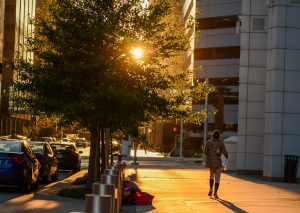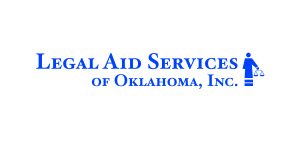Oklahoma Bar Journal
Legal Aid Services of Oklahoma: They Can't Do It All...
By Ana Reynolds

Photo by Lauren Rimmer | Oklahoma Bar Association
Oklahoma’s population, both rural and urban, is underserved by the level of currently available legal services. This statement is even more true for low-income households. One in five Oklahomans are eligible for income-based legal services.[1] Unfortunately, it is impossible for low-income legal services providers to meet this need. Nationally, “53% of low-income Americans do not know if they would be able to find a lawyer that they could afford if they needed help with a serious civil legal problem.”[2] Organizations like Legal Aid Services of Oklahoma Inc. (LASO) were created with the purpose of providing pro bono legal services, but they can’t do it all.
WHAT IS LEGAL AID SERVICES OF OKLAHOMA INC.?
“Legal Aid Services of Oklahoma, Inc. is a non-profit, 501(c)(3) organization that provides civil legal assistance to low-income persons throughout Oklahoma.”[3] It is the largest law firm in Oklahoma, made up of 18 offices across the state. Each of the offices is responsible for certain counties. For example, the Oklahoma City office covers Oklahoma and Canadian counties. Each office is made up of different areas of expertise, but the common thread among all the offices is that everyone wants to help people.
LASO is a Legal Services Corp. (LSC) grantee and is, therefore, subject to LSC regulations and limitations. LSC was originally created in 1974 to “support legal aid organizations who assist with civil matters.”[4] It helps “these organizations serve thousands of low-income individuals, children, families, seniors, and veterans in every congressional district.”[5]
Apart from the limitations on income and assets, LASO does not accept certain types of cases. LASO is a civil law firm, but it does not accept medical malpractice, personal injury or cases that are “fee-generating,” meaning a private bar attorney could take the case on a contingent basis.
WHO DOES LASO SERVE?
LASO serves “low-income individuals, children, families, seniors, and veterans.”[6] This list has some restrictions. Generally, LASO can assist individuals with “annual incomes at or below 125% of the federal poverty guidelines.”[7] The guidelines are calculated using a mathematical formula with the income of the household and the number of people in the household. LASO can also serve individuals up to 200% of the federal poverty limit if they have certain other eligibility factors.
Applications for service can be completed online at https://bit.ly/46fSE13. Applicants can also call 1-888-534-5243 or 918-428-4357 to apply by phone. Calls are answered Monday through Thursday, 9 a.m. to 4 p.m. The intake specialist will ask questions about their income, the number of people in their household and their legal issues. After receiving all the information needed, LASO can decide whether to take the applicant’s case. A list of areas of law that LASO may assist with is also available online.
WHY ARE PRO BONO ATTORNEYS NEEDED?
In 2022, LASO’s Oklahoma City office opened and closed more than 5,000 cases; out of those, only 232 cases were handled by private bar attorneys. The rest of the cases were handled by in-office attorneys, but this statistic doesn’t represent the cases LASO was unable to take.
The reality is that there is no way for LASO to take every case that comes through its doors. Every week during staffing, no matter the team, there are always a handful of cases the team cannot accept. While LASO always attempts to provide additional resources or advice to all applicants, it cannot provide full representation to every applicant. Often, LASO attorneys do not have the ability to take a case at that time.
There are many practical solutions to this ever-increasing problem. Some of those solutions include, but are not limited to, court-based self-help centers, online resources, pro se legal information, community navigators, investment in legal services programs and, of course, pro bono attorneys. Pro bono resources often include clinics for specific types of cases such as divorce, wills and estates. Other limited-scope opportunities include Law Day activities such as the OBA’s Ask A Lawyer and Lawyers in the Library. Many of these clinics are run by volunteer attorneys themselves and/or by legal services providers. These clinics are constantly evolving, and new volunteers are always needed.
LASO and other low-income legal service providers always need pro bono attorneys willing to take individual cases. As a volunteer attorney who works with LASO, volunteers have a choice of the level and scope of involvement, from advice-only clinics to full representation. Each client who is assisted by a pro bono attorney is still a LASO client. The work taken by pro bono attorneys is no less important or worthy than cases taken in-house; the need is just too great for LASO to help everyone who comes through the doors.
LASO is required to have a pro bono program, but it is also a need in the community. Without pro bono attorneys taking cases, many more people would go without legal representation. In our office, there is a process for finding cases the staff thinks would be a good fit for a pro bono case. Often, these are cases the staff attorneys would take in-house if they had the capacity to do so.
DO PRO BONO ATTORNEYS MAKE A DIFFERENCE?
Having an attorney in any legal matter can change an individual's life. For some people, it is as simple as completing their estate plan, but for others, it can be a difference of life and death. That is the story of Ms. Martin. Her name has been changed to protect the individuals involved, but she has allowed her story to be shared.
Ms. Martin came to LASO in 2020. At the time, she had a four-year-old child and was separated from her husband. Up to this point, there was no legal agreement in place for visitation, but both of them had come up with a schedule until the separation became final. One day, Ms. Martin went to pick up her child around 8 p.m. The child was hiding and eating a donut. Ms. Martin found out that this donut was the only thing they had received to eat that day. To figure out what was going on, Ms. Martin brought the issue up with the child’s father. He became angry and pulled a gun on Ms. Martin and her child. He then began making threats, saying she wasn’t allowed to leave – now or ever.
He eventually moved far enough away from the door that Ms. Martin and her child were able to escape, and then she contacted the police. She went to the courthouse to file an emergency victim protective order (VPO). While at the courthouse, they referred her to LASO for assistance. She completed an application, which she said was a straightforward process. She was contacted by a staff attorney who gave some advice; however, they told her they were unable to handle her case in-house, but they would look for a pro bono attorney.
LASO was able to find her an attorney to help with a protective order and a divorce. Ms. Martin wanted to know why the attorney had taken her case with no pay. The attorney said she believed Ms. Martin was a hardworking mother who was trying hard to survive in a dire situation. At the time, Ms. Martin didn’t have a support system; it was just her and her child. With LASO and the pro bono attorney, she had someone she could turn to with questions. In her words, “Lawyers are expensive, but that’s my child,” and she wanted to do everything she could for herself and her child.
The pro bono attorney was able to finalize a divorce with a step-up visitation plan, along with assisting Ms. Martin with a protective order. Now, more than a year after the cases were finished, Ms. Martin is an employee at LASO. She returned wanting to help people in the way she was helped. Ms. Martin is a hardworking employee, mother and member of her community, and LASO is grateful it was able to connect her with help in a frightful situation.
While Ms. Martin’s case is a success story for LASO and its pro bono program, the reality is that there are many cases where LASO is unable to find a pro bono attorney within a reasonable amount of time. LASO knows that time spent doing pro bono is time spent without payment, but many attorneys, me included, entered this field to help people.
Aside from helping the community, there are other benefits to volunteering with LASO. There are opportunities to expand practice areas, mentor law students and new attorneys, get experience in new areas of law and many more benefits, including:
- Malpractice insurance coverage by LASO on LASO-referred cases
- LASO staff attorneys available for consultation and/or training
- Access to LASO’s online support website, ProBono.Net/OK, which offers forms, training videos and research
- Assistance with litigation costs (must be preapproved)
- Up to a $75 discount on many OBA CLEs for 20 hours or more of pro bono service completed during a 12-month period
- Free LASO seminars supplying required annual CLE hours
- Interview rooms available for meetings with your client
From the material benefit of a discount on OBA CLEs to the career growth opportunities possible with free training and CLEs available, attorneys should certainly consider making a commitment to pro bono work. LASO is grateful for the pro bono attorneys who have volunteered with us in the past, and we look forward to collaborating with new attorneys. It is an unfortunate truth that Oklahoma does not have enough legal services attorneys to provide the needed services to low-income persons to ensure access to justice for all Oklahomans. Within the profession, it is recognized that it is imperative that Oklahoma attorneys provide competent and zealous advocacy for their clients. That is merely the first step on the path to creating a more just legal system for all. Each of us can play a role in filling the gap in available legal services for those who cannot afford an attorney.
 Legal Aid Services of Oklahoma is always in need of attorneys to assist with cases on a pro bono basis. Interested in volunteering? Visit www.legalaidok.org/volunteers to learn more or visit www.probono.net/ok/signup to sign up. [Add a QR code to www.probono.net/ok/signup]
Legal Aid Services of Oklahoma is always in need of attorneys to assist with cases on a pro bono basis. Interested in volunteering? Visit www.legalaidok.org/volunteers to learn more or visit www.probono.net/ok/signup to sign up. [Add a QR code to www.probono.net/ok/signup]
SELF-REFERRAL OF A PRO BONO CASE
Do you have a current client who may be income-eligible for Legal Aid? Are you representing them pro bono? If so, it would benefit you to contact LASO to register your case.
Many attorneys regularly provide pro bono representation for those who cannot otherwise afford to retain an attorney. While most attorneys think of pro bono referrals as those that originate through LASO, another lesser-known type of pro bono referral originates from the pro bono attorney’s office. Self-referrals occur when an attorney agrees to provide representation to a low-income client who contacts the attorney directly.
A prospective client may come to your office who you determine is low income and cannot afford your services. If you wish to represent the client pro bono, you can register the client with LASO. What if you initially represented a client on a “for fee” basis, but the client lost a source of income? Can it count as a pro bono self-referral? The answer is “yes” – if the client qualifies financially, and you agree to complete the case on a pro bono basis. Of course, there is no prohibition in any pro bono case against collecting attorney fees from the other side, as long as the money does not come from the client or from money the client would have been entitled to receive.
Why should you self-refer pro bono cases? Self-referrals are a great way for attorneys to provide pro bono services. The attorney is able to choose which pro bono case to take, and the client receives representation from an attorney of their choice without having to wait for the normal referral process. Benefits for self-referring pro bono cases are the same as any other LASO referral, including professional liability insurance coverage on pro bono cases, free LASO CLEs, OBA discounts on CLEs, access to a free advocate website that offers forms, research, news, featured volunteers, etc., along with many other benefits.
Clearly, self-referring pro bono cases provides benefits to the pro bono attorney and client, but it also benefits LASO by allowing us to expand our services to eligible clients without requiring additional staff. Self-referrals are also very important to LASO in that a certain level of pro bono participation is a grant requirement from our largest funder.
How do you self-refer cases? It’s as easy as a phone call, fax or email. LASO staff can contact your client and complete an intake, or you can provide the information to LASO. LASO staff will send a referral agreement for your client to sign. You may get requests from LASO staff for case updates on a quarterly basis until the case is closed unless LASO staff can determine the status of the case online. When the case is closed, LASO staff will need to know the case outcome and the number of pro bono hours. LASO will then send you a letter that you can present to the bar association for CLE discounts.
If you have an ongoing pro bono case or a prospective case that you would like to self-refer or if you have questions, contact:
Ana Reynolds
Legal Aid Services of Oklahoma Inc.
2915 N. Classen Blvd., Ste. 200
Oklahoma City, OK 73106
405-449-4430
Ana.Reynolds@laok.org
 ABOUT THE AUTHOR
ABOUT THE AUTHOR
Ana Reynolds is the pro bono coordinator for the Oklahoma City office of Legal Aid Services of Oklahoma, where she works to expand the pro bono program. Originally from New Mexico, Ms. Reynolds relocated to Oklahoma and received her J.D. from the OCU School of Law in 2022.
ENDNOTES
[1] https://bit.ly/3PhqXPv.
[2] Legal Services Corp. 2022. The Justice Gap: The Unmet Civil Legal Needs of Low-income Americans. Prepared by Mary C. Slosar, Slosar Research LLC.
[3] www.legalaidok.org/about-us.
[4] www.lsc.gov.
[5] Id.
[6] Id.
[7] Id.
Originally published in the Oklahoma Bar Journal – OBJ 95 Vol 8 (October 2023)
Statements or opinions expressed in the Oklahoma Bar Journal are those of the authors and do not necessarily reflect those of the Oklahoma Bar Association, its officers, Board of Governors, Board of Editors or staff.
